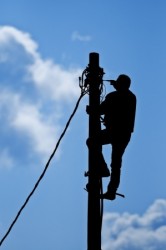ISP Zen Internet Calls on UK Government to Tackle Broadband Noise

Broadband provider Zen Internet has today called upon the Government to get tough on the causes of Repetitive Electric Impulse Noise (REIN), which references a type of electrical interference that can disrupt the performance and stability of consumer broadband services (e.g. ADSL and FTTC lines).
The problem with many REIN faults is that they sometimes occur outside of both the ISPs and infrastructure providers (e.g. BTOpenreach) ability to resolve. For example, related “noise” can be caused by nearby high-speed trains, faults in a power system (e.g. TV adapter), old-style twinkling Christmas tree lights and the list goes on.
Advertisement
Most of the time this isn’t a concern but the introduction of extra noise occurring on the same band of radio spectrum frequencies as your broadband will often disrupt the connection, which over time may significantly lower your speeds and or trigger multiple disconnections. Sadly pinpointing the exact source is extremely difficult and even when you can then the rules are far from perfect.
Gary Hough, Zen’s Regulatory Manager, said:
“Currently no one polices or looks after the frequency range that is used to make your connection work. In the last government reshuffle, this important issue that has the potential to affect every circuit in the country, was essentially parcelled off and responsibility handed over to the BBC who unfortunately have no mandate to sort out Broadband, or reason to do so, quite understandably.
If the government gave regulatory powers to one of its agencies to identify and compel people to fix their broken electrical devices, REIN faults could then be fixed and we would have a solution. Currently people who have these types of faults affecting them and who have exhausted all avenues with their ISP have little option but to complain to their MP and hope their involvement gets the 3rd party causing the problem to kindly resolve it.”
Furthermore Zen Internet also suggests that the industry standard Access Network Frequency Plan (i.e. the spectrum management plan for controlling interference within a metallic access network) could be added to the “somewhat out-dated” SIN349 document, which defines the minimum standard for both how well your phone calls will work on your land line and how fast and stable your Internet connection is (sort of).
Gary Hough added:
“This would allow all ISPs to measure a line’s capabilities for broadband services and help the national operator, [BTOpenreach], fix broken lines in a much more effective and efficient way.”
In theory a change like this could be very useful but we can imagine that some operators might have concerns about refining the standard. Meanwhile tracking down the precise source of REIN or even identifying whether or not a fault has been caused by such noise in the first place would remain extremely difficult, although no doubt the processes and procedures could be improved.
On top of all that there are some complex legal and social problems, such as how you politely go about getting your neighbor to replace a faulty piece of equipment (assuming that is even an option) when to them the device could still be working just fine. Similarly some sources of REIN might require significant infrastructure changes on the part of the third party and this might not always be viable.
Advertisement
Mark is a professional technology writer, IT consultant and computer engineer from Dorset (England), he also founded ISPreview in 1999 and enjoys analysing the latest telecoms and broadband developments. Find me on X (Twitter), Mastodon, Facebook, BlueSky, Threads.net and Linkedin.
« FREE WiFi Internet Access for 800 First Manchester UK Buses
Argos Upgrade 735 UK Stores to Offer FREE O2 WiFi Internet »






















































Comments are closed